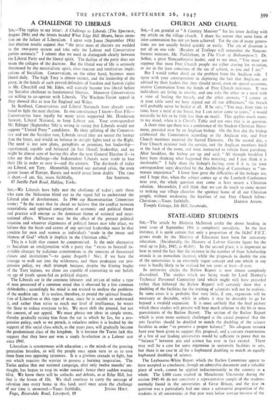CHURCH AND CHAPEL Sta,—I am grateful to " A Country
Minister " for his letter dealing with my article on the village church. I share his sorrow that some form of inter-communion has not yet been achieved. Yet the sins of many genera- tions are not usually 'healed quickly or easily. The sin of disunion is not all on one side. (Readers of Trollope will remember the Noncon- formist minister, Mr. Puddleham, in The Vicar of Bulhatrapton !) Dr. • Selbie, a great Nonconformist leader, said to me once, " You must not suppose that most Free Church people are either craving for re-union, or are in the least conscious of the sin of schism, as you and I are."
But I would rather dwell on the problem from the Anglican side. I agree with your correspondent in deploring the fact that Anglicans are advised by their leaders that they should never, even on special occasions, receive Communion from the hands of Free Church ministers. If two individuals are living in enmity, and one asks the other to a meal with a view of healing the breach, and the other answers, " I cannot sit at your table until we have argued out all our differences," the breach will probably never be healed at all. If he says, " You may, from time to time, have a meal at my house, but I can never come to yours," it would naturally be felt to be little less than an insult. This applies much more, to my mind, when it is Christ's Table and not ours that is in question.
short time ago there was a conference of the Student Christian Move- ment, presided over by an Anglican bishop. On the first day the bishop celebrated the Communion according to the Anglican rite, and Free Church members received the Sacred Elements. On the second day, a Free Church minister took the service, and the Anglican members knelt at the back of the room, and were instructed to refrain from partaking. After breakfast, the bishop got up and said, " All through breakfast I have been thinking what happened this morning, and I just think it is intolerable." I fully share the bishop's feeling, even if it is, (as your correspondent says) described by the Archbishop of Canterbury as " im- mature impatience." I know how great the difficulties of the bishops are, and I hope that, when the subject comes up at the Lambeth Conference next year, the whole question may come at least nearer a Christian solution. Meanwhile, I still think that we can do much to come nearer to making our village churches the spiritual home of all our Christian people, without weakening the loyalties of our Free Church fellow- Christians.—Yours faithfully, HAROLD ANSON. Temple Cottage, Ide Hill, Sevenoaks.


































 Previous page
Previous page